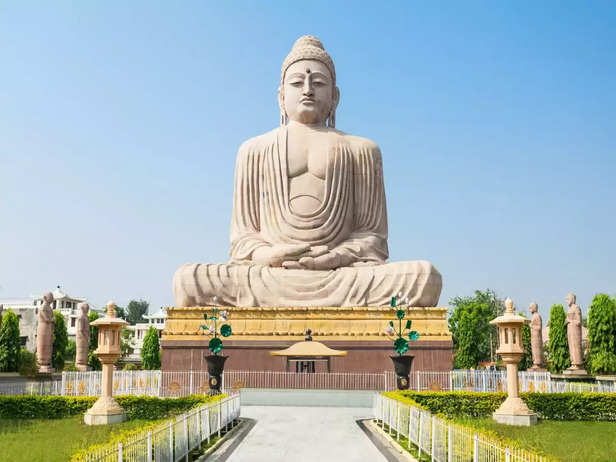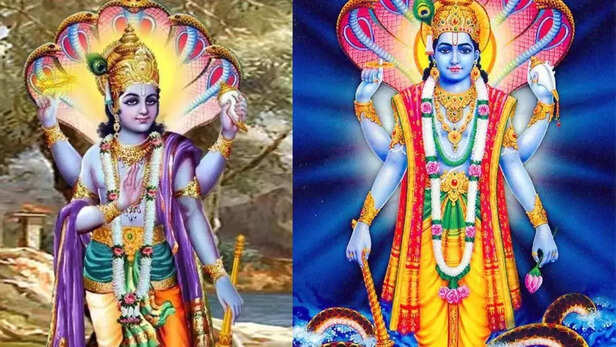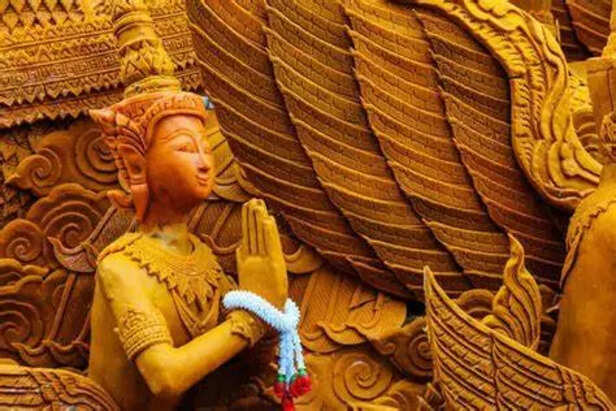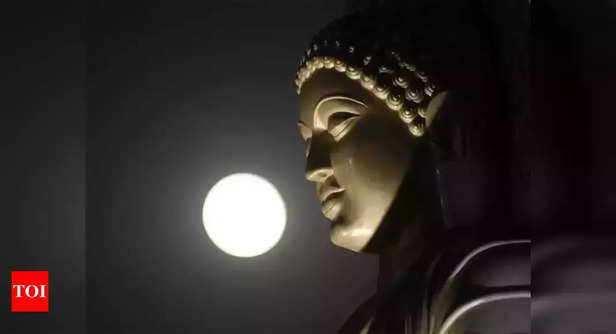Mythology Meets Philosophy: Why Buddha is Considered Vishnu’s Avatar
Nidhi | Dec 24, 2024, 13:27 IST
Lord Buddha
Explore the profound connection between Buddha and Vishnu’s avatars, where Lord Buddha is revered as the ninth avatar of Vishnu in Hindu mythology. This article examines the life of Siddhartha Gautama, his path to enlightenment, and how his teachings of compassion and nonviolence resonate with both Buddhism and Hinduism. Discover how the connection between Buddhism and Hinduism reflects shared values of peace, dharma, and spiritual growth.
"Buddha once said, 'Peace comes from within. Do not seek it without.' This profound truth reflects the journey of Siddhartha Gautama, a prince who renounced a life of luxury to seek a deeper understanding of suffering and enlightenment. His teachings, which emphasize compassion, nonviolence, and the path to inner peace, transcended his time, shaping a spiritual tradition that continues to inspire millions. But what if we told you that Buddha’s story is also intertwined with another powerful tradition—Hinduism? In a unique twist of religious philosophy, Buddha is regarded as the ninth avatar of Vishnu, the divine preserver. This fascinating convergence of beliefs highlights how two distinct spiritual paths can align in their ultimate pursuit: the restoration of balance, compassion, and enlightenment for all beings."
Scriptural Authority: Hindus deeply respect sages who authored the Puranas and epics, believing their words to be infallible. The inclusion of Buddha in these texts underscores their divine legitimacy.
Buddha’s Birth and Prophecy: Siddhartha Gautama, later known as Buddha, was born into a Hindu family. Legends say his horoscope predicted he would either become a great king or a great sage, hinting at his extraordinary destiny.
The Divine Dream: A popular legend narrates that Buddha’s mother, Queen Maya, dreamt of a six-tusked white elephant entering her womb—a symbol of divine intervention and purity. This dream aligns with Hindu depictions of avatars being born under miraculous circumstances.
Symbolic Role: In Hindu mythology, avatars often emerge to correct a disturbance in dharma. Buddha’s teachings, which promoted nonviolence and compassion, are seen as a response to excessive ritualism and animal sacrifices prevalent during his time.
Integration into Hinduism: Some suggest that identifying Buddha as a Vishnu avatar was a way for Hinduism to absorb the growing influence of Buddhism, portraying it as part of the broader Hindu tradition.

Hindu mythology draws heavily on sacred texts to substantiate its beliefs. Many Puranas and epics explicitly mention Buddha as an avatar of Vishnu. These texts include:
Vishnu Purana (3.18): Describes Vishnu’s avatars and mentions Buddha as one of them.
Bhagavata Purana (1.3.24, 2.7.37, 3.15.26): Chronicles the appearance of Buddha as a divine intervention.
Garuda Purana (1.1, 2.30.37, 3.15.26): Explains Buddha’s role in restoring dharma.
Agni Purana (16, 49.8): Lists Buddha among Vishnu’s incarnations.
Linga Purana (1.71): Associates Buddha’s teachings with Vishnu’s cosmic duties.
Padma Purana (3.252): Highlights Buddha’s mission to dissuade people from violence.
Naradiya Purana (2.72): Mentions Buddha’s divine purpose.
Harivamsha (1.41): Acknowledges Buddha’s role in cosmic cycles.
Brihat Parashara Hora Shastra (2:1-5/7): References Buddha in astrological contexts.
Gita Govindam by Jayadeva: Celebrates Buddha as Vishnu’s avatar in poetic verses.
These texts collectively portray Buddha as an incarnation who emerged to fulfill a specific divine mission: to steer humanity away from harmful rituals and reestablish dharma.

Interestingly, no Buddhist scripture mentions Buddha as an avatar of Vishnu. This absence of acknowledgment has led some scholars and Buddhists to interpret the claim as a strategic move by Brahmins to integrate Buddhism into Hinduism. By framing Buddha as a Vishnu avatar, Hinduism may have aimed to subsume Buddhism and diminish its distinct identity, reducing it to a sect within the broader Hindu tradition.
Some Buddhists view this as a deliberate effort to overshadow the unique philosophy of Buddhism, which emphasizes self-realization and rejects the idea of a creator god. This belief underscores the tension between the two traditions while highlighting their historical interactions.

The identification of Buddha as Vishnu’s avatar is not merely a mythological assertion but also a philosophical bridge between two major religions. While Hinduism incorporates Buddha into its fold, Buddhism remains distinct in its doctrines. This duality invites dialogue on the universality of spiritual truths and the fluidity of religious boundaries.
Hinduism’s narrative presents Buddha as a divine being who emerged to restore dharma, while Buddhism views him as an enlightened teacher who sought to guide humanity through wisdom and compassion. This divergence reflects broader questions about the nature of spirituality and the role of divine intervention in human affairs.

The belief in Buddha as Vishnu’s avatar illustrates how mythology and philosophy intertwine to shape religious narratives. Rooted in ancient texts, this notion reflects Hinduism’s inclusivity and adaptability. At the same time, it highlights the enduring distinctiveness of Buddhist teachings. Whether viewed as a divine incarnation or a historical sage, Buddha’s legacy transcends religious labels, continuing to inspire seekers across the world.
Reasons Behind Considering Buddha as Vishnu’s Avatar

Buddha
Scriptural Authority: Hindus deeply respect sages who authored the Puranas and epics, believing their words to be infallible. The inclusion of Buddha in these texts underscores their divine legitimacy.
Buddha’s Birth and Prophecy: Siddhartha Gautama, later known as Buddha, was born into a Hindu family. Legends say his horoscope predicted he would either become a great king or a great sage, hinting at his extraordinary destiny.
The Divine Dream: A popular legend narrates that Buddha’s mother, Queen Maya, dreamt of a six-tusked white elephant entering her womb—a symbol of divine intervention and purity. This dream aligns with Hindu depictions of avatars being born under miraculous circumstances.
Symbolic Role: In Hindu mythology, avatars often emerge to correct a disturbance in dharma. Buddha’s teachings, which promoted nonviolence and compassion, are seen as a response to excessive ritualism and animal sacrifices prevalent during his time.
Integration into Hinduism: Some suggest that identifying Buddha as a Vishnu avatar was a way for Hinduism to absorb the growing influence of Buddhism, portraying it as part of the broader Hindu tradition.
Hindu Scriptures Supporting the Claim

Bhagavata Purana
Hindu mythology draws heavily on sacred texts to substantiate its beliefs. Many Puranas and epics explicitly mention Buddha as an avatar of Vishnu. These texts include:
Vishnu Purana (3.18): Describes Vishnu’s avatars and mentions Buddha as one of them.
Bhagavata Purana (1.3.24, 2.7.37, 3.15.26): Chronicles the appearance of Buddha as a divine intervention.
Garuda Purana (1.1, 2.30.37, 3.15.26): Explains Buddha’s role in restoring dharma.
Agni Purana (16, 49.8): Lists Buddha among Vishnu’s incarnations.
Linga Purana (1.71): Associates Buddha’s teachings with Vishnu’s cosmic duties.
Padma Purana (3.252): Highlights Buddha’s mission to dissuade people from violence.
Naradiya Purana (2.72): Mentions Buddha’s divine purpose.
Harivamsha (1.41): Acknowledges Buddha’s role in cosmic cycles.
Brihat Parashara Hora Shastra (2:1-5/7): References Buddha in astrological contexts.
Gita Govindam by Jayadeva: Celebrates Buddha as Vishnu’s avatar in poetic verses.
These texts collectively portray Buddha as an incarnation who emerged to fulfill a specific divine mission: to steer humanity away from harmful rituals and reestablish dharma.
Buddhist Perspective on the Claim

Lord Vishnu
Interestingly, no Buddhist scripture mentions Buddha as an avatar of Vishnu. This absence of acknowledgment has led some scholars and Buddhists to interpret the claim as a strategic move by Brahmins to integrate Buddhism into Hinduism. By framing Buddha as a Vishnu avatar, Hinduism may have aimed to subsume Buddhism and diminish its distinct identity, reducing it to a sect within the broader Hindu tradition.
Some Buddhists view this as a deliberate effort to overshadow the unique philosophy of Buddhism, which emphasizes self-realization and rejects the idea of a creator god. This belief underscores the tension between the two traditions while highlighting their historical interactions.
Philosophical Implications

Buddha Scriptures
The identification of Buddha as Vishnu’s avatar is not merely a mythological assertion but also a philosophical bridge between two major religions. While Hinduism incorporates Buddha into its fold, Buddhism remains distinct in its doctrines. This duality invites dialogue on the universality of spiritual truths and the fluidity of religious boundaries.
Hinduism’s narrative presents Buddha as a divine being who emerged to restore dharma, while Buddhism views him as an enlightened teacher who sought to guide humanity through wisdom and compassion. This divergence reflects broader questions about the nature of spirituality and the role of divine intervention in human affairs.
Last Thoughts

Lord Buddha
The belief in Buddha as Vishnu’s avatar illustrates how mythology and philosophy intertwine to shape religious narratives. Rooted in ancient texts, this notion reflects Hinduism’s inclusivity and adaptability. At the same time, it highlights the enduring distinctiveness of Buddhist teachings. Whether viewed as a divine incarnation or a historical sage, Buddha’s legacy transcends religious labels, continuing to inspire seekers across the world.
